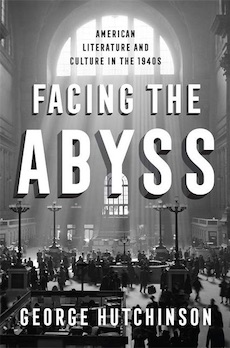Shortlisted for the 2019 Christian Gauss Award
By Louis J. Kern
Norman Mailer located the malaise of post WWII America in “the psychic havoc of the concentration camps and the atom bomb [had] upon the unconscious minds of almost everyone alive in those years….our psyche has subjected itself to the intolerable anxiety that death being causeless, life was causeless as well, that time deprived of cause and effect had come to a stop. (“The White Negro,” Dissent, 1957).” “This is the abyss,” Alfred Kazin wrote, “that great literature fills,” out of which writers of the 1940s, racked with guilt, dread, and a pervasive sense of radical evil, produced, arguably, “the most intensely literary decade in American history.”
George Hutchinson recuperates the cultural ambience of the 1940s—its literature, music, art, philosophy—suspended above an existential pit. Pursuant to the democratizing ideology of the war, he finds its primary tendency the “urge to universality.” His transformative and crucial re-visioning of this era’s courageously hopeful generation is an important addition to the critical literature.
Eschewing the elitism and pure aestheticism of earlier generations, cultural forms of the 40s sought inclusivity and aspired to universalism. Democratization of taste was promoted in wartime Armed Services Editions that sparked the rise of mass market paperbacks post-war, the expansion of public libraries, the Modern Library reprint series, and the Book-of-the-Month Club. Comic books were liminal vehicles that reconstructed classic literary motifs and popularized Freudian psychopathology.
Moving from the traumatic dissociation of wartime literature, characterized by pervasive feelings of separation, loneliness, and a sense of chaotic unreality, Hutchinson examines Jewish, Black, Queer, and Female literary production. One of the strengths of the volume is its consideration of lesser known writers, critics, and cultural figures rather than a focus on the most popular and prominent figures. For the famous, he discusses their less familiar work, e.g., Saul Bellow’s Dangling Man (1944), his first novel.
The themes of inclusivity and universality are most effectively treated in his discussions of Jewish and African-American work. Black fiction often prioritizes white characters, emphasizing universal “human qualities” rather than exclusively Black concerns and societal racism; e.g., Ann Petry’s Country Place (1947) set in Old Saybrook, Connecticut, with primarily white characters. At the same time, the expansion of the African-American periodical press—Negro Digest (1942), Ebony (1945), and Jet (1945), provided widespread consideration of civil rights and everyday Black life. Jewish writers of the period were not self-consciously Jewish but sought broader inclusion in multi-ethnic American society. There was little consideration of the Holocaust, and Christian-inflected themes were common as in Karl Shapiro’s V-Letter (1944).
Chapters on queer and feminine fiction are the least effective in demonstrating the central themes of inclusivity and universality; the writers seem more concerned with the depiction of the travails of the sexual and gender outsider (queer literature) or the inequities of the male/female relationship.
Hutchinson’s most effective chapters deal with the nascent ecology movement and the attempt to create a world government, establish universal human rights, assure world peace, and ultimately achieve planetary humanism. In these efforts utopian hopes for a post-war world were manifest. The struggles to establish the United Nations and the Universal Declaration of Human Rights evidenced the difficulties blocking the transition to a trans-national world. Ultimately, the Soviet development of the atomic bomb (1949) and the McCarthy-era fear of a communist conspiracy destroyed the hopes of the post-war generation. American consciousness closed in on itself, the expansive, internationalist vision retreated, nationalism resurged, and writers became more focused on issues specifically related to their own communities and personal conditions; a culture of identity politics displaced the broader global humanism of the 1940s.
Louis J. Kern (ΦBK, Clark University) is professor emeritus of history at Hofstra University. Hofstra University is home to the Omega of New York chapter of Phi Beta Kappa.




